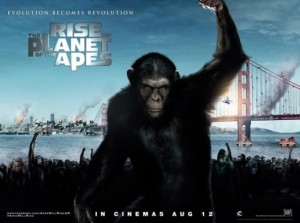 Over the weekend I took the advice of 20th Century Fox years ago when it encouraged audiences to “Go ape!” and I saw Rise of the Planet of the Apes. My expectations for cinematic failure were thankfully never realized, and instead, the film is very well done, and a welcome addition to the Apes franchise and mythological canon.
Over the weekend I took the advice of 20th Century Fox years ago when it encouraged audiences to “Go ape!” and I saw Rise of the Planet of the Apes. My expectations for cinematic failure were thankfully never realized, and instead, the film is very well done, and a welcome addition to the Apes franchise and mythological canon.
I wrote a review of the film for Cinefantastique Online titled “Rise of the Planet of the Apes: A Welcome Addition to the Apes Mythological Canon,” which can be found at this link. Here is an excerpt.
The bar was set high in 1968. The original Planet of the Apes combined a number of elements to make science fiction history. These included good source material in Pierre Boulle’s novel, a solid screenplay by Michael Wilson and Rod Serling, A-list actors including Charlton Heston and Roddy McDowall, John Chamber’s groundbreaking makeup effects, Jerry Goldsmith’s daring score, and Franklin Schaffner’s direction. In addition, the story interacted with cultural and social anxieties and issues of the late 1960s, including the potential for nuclear annihilation, racism, as well as evolution and religious fundamentalism. Rise of the Planet of the Apes has continued in this vein, not only providing amazingly realistic apes through its motion-capture CGI, but by combining the special effects necessary to convey the story realistically with contemporary cultural issues, including biomedical ethics and non-human animal rights. In this way the film provides something for those looking for little more than a summer thrill through science fiction cinema, as well as for those interested in speculative fiction as a foil for social reflection and commentary.
In addition to my review, I was a part of a panel discussion on the film at the Cinefantastique Spotlight Podcast 2:30.1. This podcast is the feature at the Huffington Post on the HuffPost Culture page. You might also enjoy the after-the-show podcast discussion that looked at the history of the Apes franchise.
For those interested in exploring Rise of the Apes within its broader context of Apes mythology I recommend starting with Pierre Boule’s novel which was the original source material, and for background and behind-the-scenes for the films take a look at Planet of the Apes Revisited by Joe Russo and Larry Landsman with Edward Gross (St. Martin’s Griffin, 2001), then moving to cultural analysis with Planet of the Apes as American Myth: Race and Politics in the Films and Television Series by Eric Greene (McFarland and Co., 2006). If after this you become a fan, you can watch the original Planet of the Apes on Amazon Instant Video or purchase it on DVD, and even better, grab the 40th anniversary collection on Blu-ray.
Related posts:
“Planet of the Apes: Intelligent Sci-Fi Past and Present”
“Planet of the Apes: An American Myth”
“Robert J. Sawyer, “A long time ago,” and Science Fiction’s Social Commentary”





I liked your review, and also liked the new Apes movie. I wouldn’t say it was better than the 1968 movie as such (apart from the more sophisticated special effects possible now), but it complements it. This latest movie was more solid science fiction, whereas the original was SF plus allegory and satire. The differences are complementary rather than better or worse.
I think we’re in agreement, Carl. With a classic film and great piece of intelligent science fiction the new film could not be better, an unrealistic expectation, but as I trued to argue, it is a good film in its own right, and one that is worthy for the Apes mythology. A welcome summer surprise indeed.